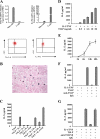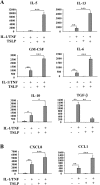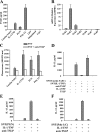Thymic stromal lymphopoietin is released by human epithelial cells in response to microbes, trauma, or inflammation and potently activates mast cells
- PMID: 17242164
- PMCID: PMC2118732
- DOI: 10.1084/jem.20062211
Thymic stromal lymphopoietin is released by human epithelial cells in response to microbes, trauma, or inflammation and potently activates mast cells
Abstract
Compelling evidence suggests that the epithelial cell-derived cytokine thymic stromal lymphopoietin (TSLP) may initiate asthma or atopic dermatitis through a dendritic cell-mediated T helper (Th)2 response. Here, we describe how TSLP might initiate and aggravate allergic inflammation in the absence of T lymphocytes and immunoglobulin E antibodies via the innate immune system. We show that TSLP, synergistically with interleukin 1 and tumor necrosis factor, stimulates the production of high levels of Th2 cytokines by human mast cells (MCs). We next report that TSLP is released by primary epithelial cells in response to certain microbial products, physical injury, or inflammatory cytokines. Direct epithelial cell-mediated, TSLP-dependent activation of MCs may play a central role in "intrinsic" forms of atopic diseases and explain the aggravating role of infection and scratching in these diseases.
Figures




References
-
- Kay, A.B. 2006. The role of T lymphocytes in asthma. Chem. Immunol. Allergy. 91:59–75. - PubMed
-
- Ziegler, S.F., and Y.J. Liu. 2006. Thymic stromal lymphopoietin in normal and pathogenic T cell development and function. Nat. Immunol. 7:709–714. - PubMed
-
- Soumelis, V., P.A. Reche, H. Kanzler, W. Yuan, G. Edward, B. Homey, M. Gilliet, S. Ho, S. Antonenko, A. Lauerma, et al. 2002. Human epithelial cells trigger dendritic cell mediated allergic inflammation by producing TSLP. Nat. Immunol. 3:673–680. - PubMed
Publication types
MeSH terms
Substances
LinkOut - more resources
Full Text Sources
Other Literature Sources
Medical
Molecular Biology Databases

